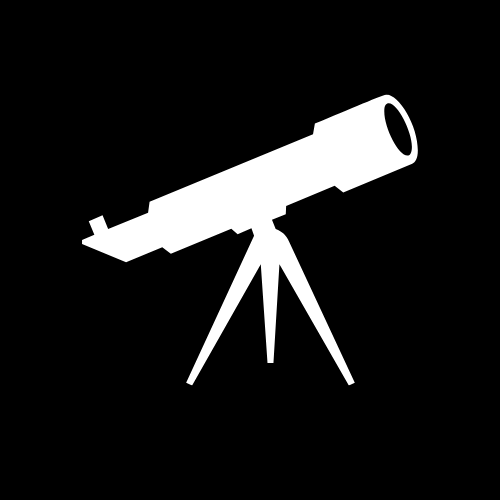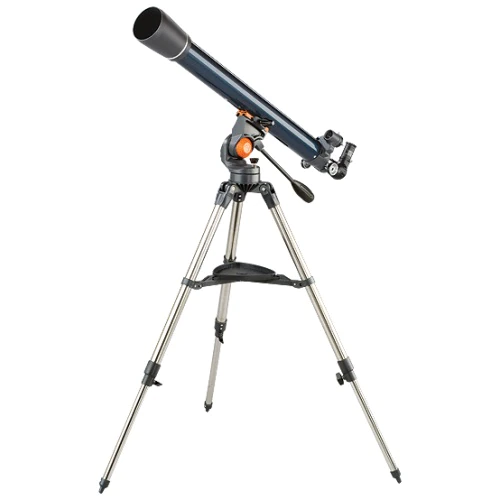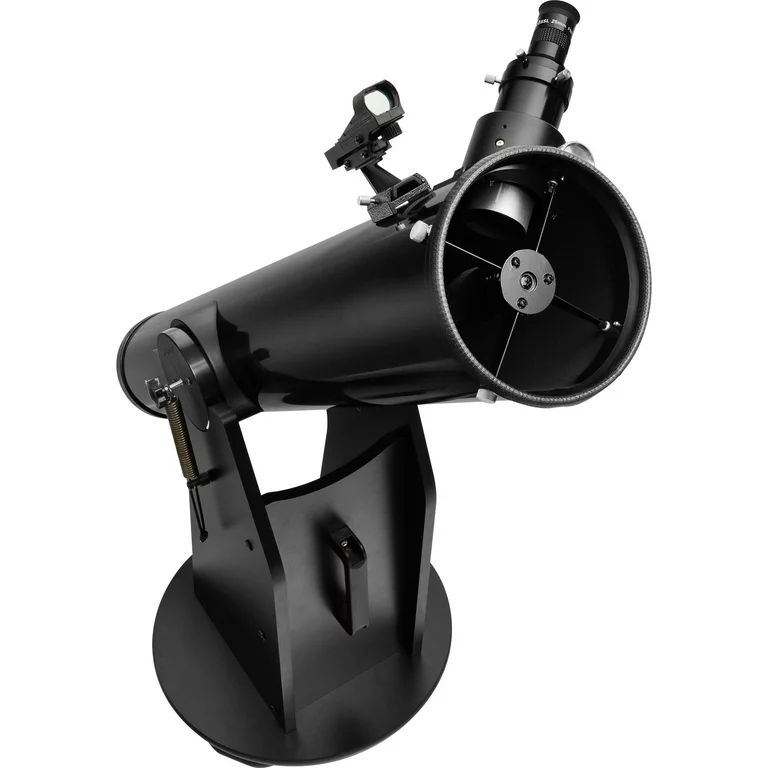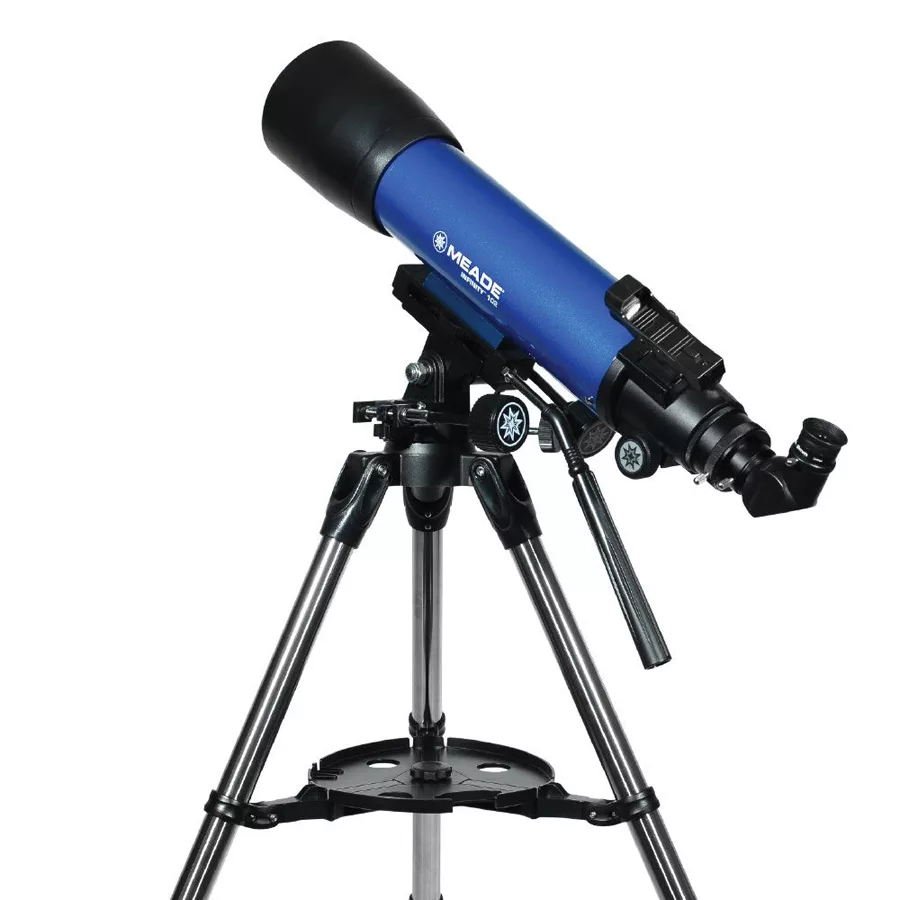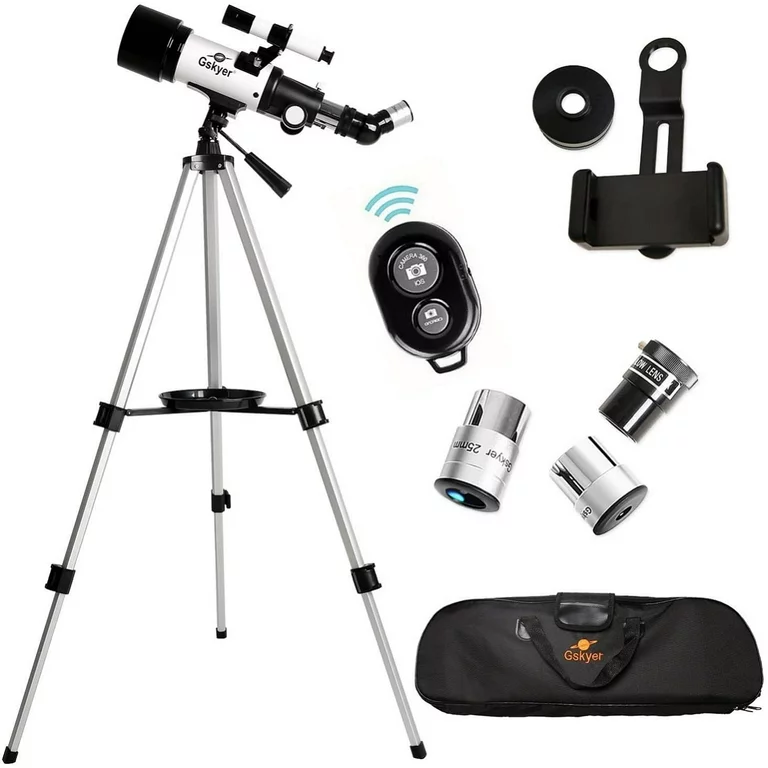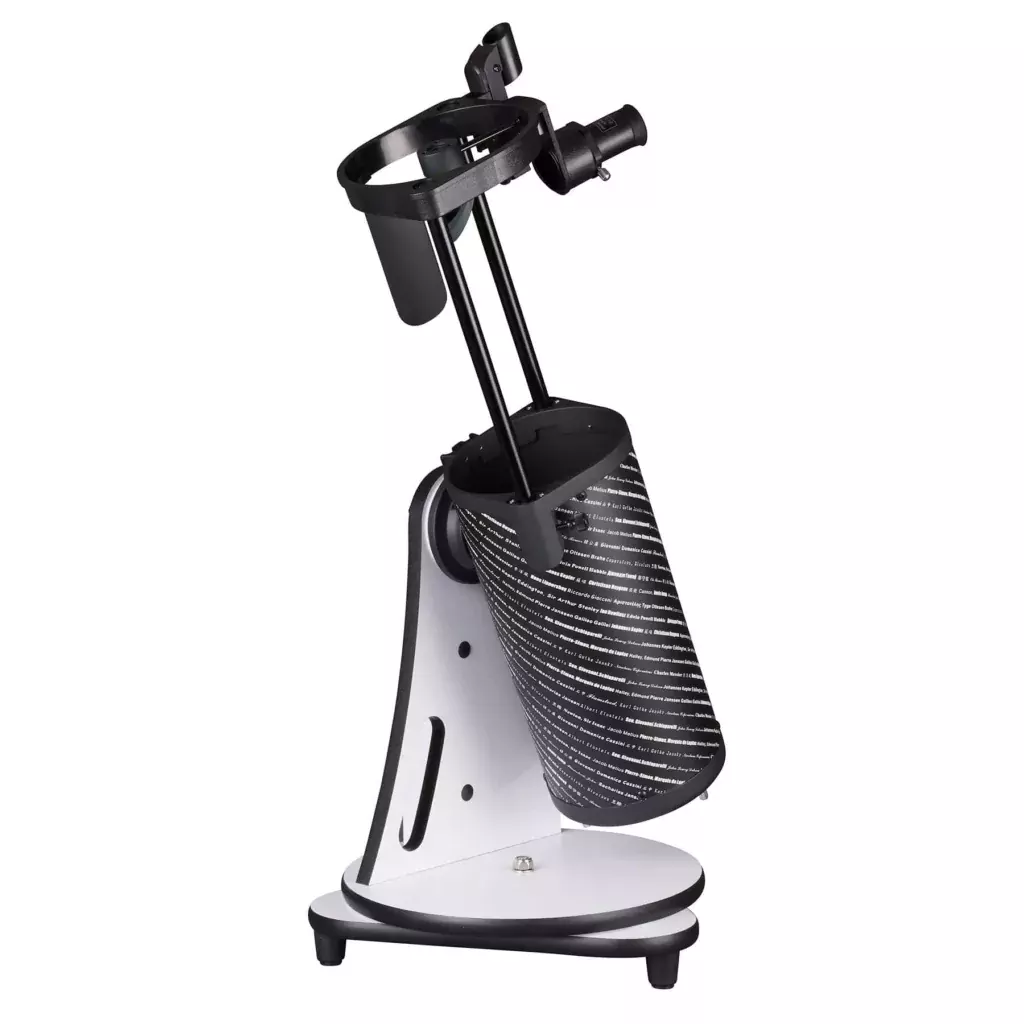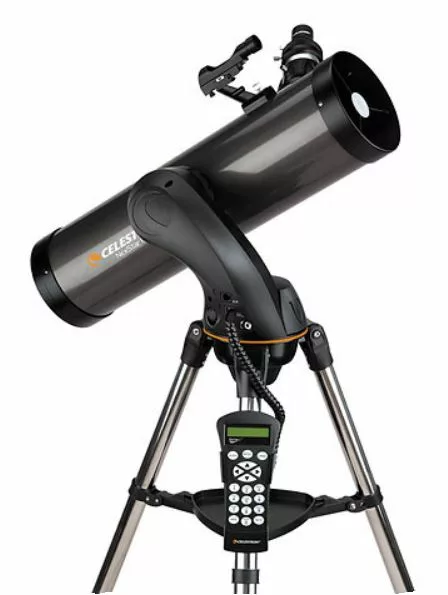Top 7 Telescopes for Beginners 2024
Astronomy, the ancient and ever-evolving study of celestial objects, has captivated humanity for centuries. The night sky, with its endless array of stars, planets, and galaxies, offers a window into the vast and mysterious universe that surrounds us. For many, the allure of uncovering these cosmic secrets begins with a simple, yet profound step – choosing their first telescope.
In this digital age, where the wonders of the universe are more accessible than ever, the right equipment can make all the difference. A beginner-friendly telescope is not just a tool; it’s a gateway to adventure, learning, and a lifelong passion for the cosmos. It’s about finding that perfect balance between user-friendliness, quality, and affordability – a combination that can ignite the spark of curiosity and keep it burning brightly.
As we delve into the world of telescopes, it’s important to remember that the best telescope for a beginner is one that encourages exploration without overwhelming complexity. This guide is designed to help you navigate the vast array of options available, focusing on telescopes that are ideal for those just starting their astronomical journey. Whether you’re aiming to catch a glimpse of the craters on the Moon, the rings of Saturn, or the Andromeda Galaxy, the journey starts here, with the right telescope in your hands.
Join us as we explore the top 7 telescopes for beginners, each carefully selected to offer the best possible start to your stargazing adventures. From refractors to reflectors, from manual mounts to computerized systems, we’ve got you covered. Let’s embark on this celestial journey together, one starry night at a time.
1. Celestron AstroMaster 70AZ Refractor
Description:
The Celestron AstroMaster 70AZ Refractor is a stellar choice for beginners in the world of astronomy. This telescope combines ease of use with powerful optics, making it ideal for those taking their first steps into stargazing. Its user-friendly design ensures a smooth introduction to observing the night sky, while its quality optics provide clear and detailed views of celestial objects. Whether it’s observing the craters of the Moon, the rings of Saturn, or distant star clusters, the AstroMaster 70AZ is a reliable companion for your celestial explorations.
Specs Table:
| Specification | Detail |
|---|---|
| Optical Design | Refractor |
| Aperture | 70mm |
| Focal Length | 700mm |
| Focal Ratio | f/10 |
| Mount Type | Altazimuth |
| Eyepieces Included | 20mm (35x), 10mm (70x) |
| Finderscope | Built-in StarPointer |
| Weight | Approximately 8 kg (17.6 lbs) |
| Additional Features | Erect image optics for terrestrial and astronomical use |
Pros & Cons:
Pros:
- Ease of Use: Perfect for beginners with its straightforward setup and operation.
- Versatility: Suitable for both terrestrial and astronomical observations.
- Portability: Lightweight and easy to transport, making it great for various observation locations.
- Quality Optics: Provides clear and crisp images, enhancing the viewing experience.
Cons:
- Limited Aperture: While sufficient for beginners, the 70mm aperture may limit the viewing of fainter objects.
- Stability: The lightweight design can lead to some instability, especially in windy conditions.
- Manual Tracking: Requires manual adjustment to track celestial objects, which might be challenging for some beginners.
The Celestron AstroMaster 70AZ Refractor stands out as an excellent starting point for anyone eager to explore the night sky, offering a balance of quality, ease, and affordability.
2. Orion SkyQuest XT6 Classic Dobsonian
Description:
The Orion SkyQuest XT6 Classic Dobsonian telescope is a fantastic choice for beginners who are serious about delving into the world of astronomy. This telescope is renowned for its simplicity and effectiveness, offering an excellent balance between portability and powerful optics. The Dobsonian design is particularly user-friendly, making it easy for novices to navigate the night sky. With its substantial aperture and reliable optics, the SkyQuest XT6 allows users to explore a wide range of celestial objects, from the Moon’s craters to distant galaxies.
Specs Table:
| Specification | Detail |
|---|---|
| Optical Design | Reflector |
| Aperture | 114mm (4.5 inches) |
| Focal Length | 1178mm |
| Focal Ratio | f/7.8 |
| Mount Type | Dobsonian |
| Eyepieces Included | 25mm (36x), 10mm (90x) |
| Finderscope | 6×30 |
| Weight | Approximately 10.5 kg (31 lbs) |
| Additional Features | Collapsible tube for easy storage and transport |
Pros & Cons:
Pros:
- Excellent Light Gathering: The 114mm aperture provides bright, clear views of celestial objects.
- Sturdy and Stable: The Dobsonian mount offers a solid and stable viewing platform.
- Ease of Use: Simple design makes it easy to point and view, ideal for beginners.
- Value for Money: Offers great optical quality at an affordable price.
Cons:
- Size and Portability: While collapsible, it’s still bulkier compared to some refractor models.
- Manual Operation: Requires manual tracking of celestial objects, which might be a learning curve for some.
- Limited High-Power Viewing: While great for wide-field viewing, it may not provide the highest detail for planets.
The Orion SkyQuest XT6 Classic Dobsonian is an excellent telescope for beginners who want a straightforward, effective, and enjoyable stargazing experience. Its combination of a user-friendly design and powerful optics makes it a popular choice for those starting their astronomical journey.
3. Meade Instruments Infinity 102AZ
Description:
The Meade Instruments Infinity 102AZ is a refractor telescope that stands out as an ideal choice for beginners, especially those interested in both astronomical and terrestrial viewing. This telescope offers a significant aperture in a manageable size, making it a versatile option for a wide range of observations. Its Altazimuth mount and simple design facilitate easy pointing and tracking, which is crucial for those new to stargazing. The Infinity 102AZ is known for its bright, clear images and user-friendly setup, making the exploration of the moon, planets, and beyond both enjoyable and educational.
Specs Table:
| Specification | Detail |
|---|---|
| Optical Design | Refractor |
| Aperture | 102mm (4 inches) |
| Focal Length | 600mm |
| Focal Ratio | f/5.9 |
| Mount Type | Altazimuth |
| Eyepieces Included | 26mm (23x), 9mm (67x), 6.3mm (95x) |
| Finderscope | Red Dot |
| Weight | Approximately 5.5 kg (12 lbs) |
| Additional Features | Slow-motion control rod for precise tracking, accessory tray |
Pros & Cons:
Pros:
- Large Aperture: Offers bright and clear views with its 102mm aperture.
- Versatile Use: Suitable for both astronomical and terrestrial observations.
- User-Friendly: Easy to assemble and use, ideal for beginners.
- Accessories: Comes with multiple eyepieces and a red dot finderscope for enhanced viewing.
Cons:
- Stability: The lightweight design may lead to some instability, especially at higher magnifications.
- Chromatic Aberration: As a refractor, it may exhibit some chromatic aberration on bright objects.
- Size: While portable, it is larger than some entry-level telescopes.
The Meade Instruments Infinity 102AZ is a fantastic telescope for beginners, offering a balance of quality optics, ease of use, and versatility. It’s an excellent choice for those looking to start their journey into astronomy and terrestrial viewing with a reliable and enjoyable instrument.
4. Gskyer AZ 70400 Travel Refractor Telescope
Description:
The Gskyer AZ 70400 Travel Refractor Telescope is an excellent choice for beginners, particularly those who value portability and ease of use. This compact telescope is designed for travelers and amateur astronomers who want a lightweight and manageable telescope without compromising on quality. It offers clear and bright images, making it suitable for both celestial and terrestrial observations. The AZ 70400 is known for its user-friendly setup and operation, making it a great entry-level telescope for those new to astronomy and for young stargazers.
Specs Table:
| Specification | Detail |
|---|---|
| Optical Design | Refractor |
| Aperture | 70mm (2.75 inches) |
| Focal Length | 400mm |
| Focal Ratio | f/5.7 |
| Mount Type | Altazimuth |
| Eyepieces Included | 25mm (16x), 10mm (40x), 5mm (80x) |
| Finderscope | 5×24 |
| Weight | Approximately 2.8 kg (6.2 lbs) |
| Additional Features | Adjustable aluminum tripod, carrying bag |
Pros & Cons:
Pros:
- Portability: Compact and lightweight, ideal for travel and outdoor adventures.
- Ease of Use: Simple setup and operation, perfect for beginners and children.
- Versatility: Good for both astronomical and terrestrial viewing.
- Accessories: Comes with multiple eyepieces and a carrying bag for convenience.
Cons:
- Limited Aperture: Smaller aperture limits the visibility of faint objects.
- Stability: The lightweight tripod may not be as stable as heavier models.
- Optical Quality: May not provide the sharpest images at higher magnifications.
The Gskyer AZ 70400 Travel Refractor Telescope is a great starter telescope for those who are looking for an affordable, portable, and easy-to-use option. It’s particularly well-suited for young astronomers and families who enjoy outdoor stargazing experiences.
5. Sky-Watcher Heritage-130P FlexTube
Description:
The Sky-Watcher Heritage-130P FlexTube is a uniquely designed telescope that combines portability with powerful optics. It’s a Dobsonian reflector telescope that features a collapsible tube design, making it highly portable and easy to store. This telescope is particularly well-suited for beginners and intermediate astronomers who want a balance between ease of use and the ability to observe fainter celestial objects. The Heritage-130P offers excellent light-gathering capabilities with its 130mm aperture, providing clear and bright views of the moon, planets, and deep-sky objects. Its intuitive Dobsonian mount makes navigation through the night sky straightforward and enjoyable.
Specs Table:
| Specification | Detail |
|---|---|
| Optical Design | Parabolic Newtonian Reflector |
| Aperture | 130mm (5.1 inches) |
| Focal Length | 650mm |
| Focal Ratio | f/5 |
| Mount Type | Dobsonian |
| Eyepieces Included | 25mm (26x), 10mm (65x) |
| Finderscope | Red Dot |
| Weight | Approximately 6.2 kg (13.7 lbs) |
| Additional Features | Collapsible tube design, tension control handle |
Pros & Cons:
Pros:
- Compact Design: Collapsible tube makes it highly portable and easy to store.
- Powerful Optics: Large aperture provides bright and clear views of celestial objects.
- User-Friendly: Simple and intuitive Dobsonian mount, great for beginners.
- Versatility: Suitable for both planetary and deep-sky observations.
Cons:
- Collimation: May require frequent collimation (alignment of mirrors).
- Stability: The mount, while easy to use, may lack the stability of heavier tripods.
- No Tripod: Requires a stable surface or an additional tripod for use.
The Sky-Watcher Heritage-130P FlexTube is an excellent choice for those who want a telescope that is both portable and capable of delivering impressive views of the night sky. Its innovative design and user-friendly features make it a favorite among beginners and seasoned stargazers alike.
6. Celestron NexStar 130SLT Computerized Telescope
Description:
The Celestron NexStar 130SLT is a computerized reflector telescope that offers a perfect blend of advanced technology and user-friendliness, making it an ideal choice for beginners and intermediate astronomers. This telescope features a fully computerized altazimuth mount and Celestron’s SkyAlign technology, allowing users to easily align the telescope and navigate the night sky. With its 130mm aperture, the NexStar 130SLT gathers ample light to reveal detailed views of the moon, planets, and deep-sky objects like nebulae and galaxies. Its portability and automated features make it an excellent choice for those who want a hassle-free stargazing experience with the ability to quickly locate and track celestial objects.
Specs Table:
| Specification | Detail |
|---|---|
| Optical Design | Newtonian Reflector |
| Aperture | 130mm (5.1 inches) |
| Focal Length | 650mm |
| Focal Ratio | f/5 |
| Mount Type | Computerized Altazimuth |
| Eyepieces Included | 25mm (26x), 9mm (72x) |
| Finderscope | StarPointer |
| Weight | Approximately 8 kg (17.6 lbs) |
| Additional Features | SkyAlign technology, database of over 4,000 celestial objects |
Pros & Cons:
Pros:
- Automated Tracking: Computerized mount with SkyAlign for easy alignment and tracking.
- Large Aperture: Good light-gathering capability for clear and detailed views.
- User-Friendly: Ideal for beginners due to its automated features and simple setup.
- Educational: Extensive database of celestial objects, great for learning.
Cons:
- Battery Consumption: Can be heavy on battery usage.
- Initial Setup: Some learning curve involved in setting up and using the computerized system.
- Portability: While portable, it is heavier than some other beginner telescopes.
The Celestron NexStar 130SLT Computerized Telescope is a fantastic option for those who are looking for a modern, easy-to-use telescope with advanced features. It is especially suited for beginners who want to dive into astronomy without the complexities of manual tracking and alignment.
7. Zhumell Z114 Portable Altazimuth Reflector Telescope
Description:
The Zhumell Z114 Portable Altazimuth Reflector Telescope is an excellent choice for beginners due to its combination of simplicity, portability, and quality optics. This telescope features a compact and lightweight design, making it easy to transport and set up, ideal for impromptu stargazing sessions. With a 114mm parabolic primary mirror, the Z114 gathers enough light to provide clear and bright views of the moon, planets, and even some deep-sky objects like nebulae and star clusters. Its altazimuth mount is straightforward and intuitive, perfect for beginners who are just learning how to navigate the night sky. The Zhumell Z114 is a great entry-level telescope that doesn’t compromise on the quality of the viewing experience.
Specs Table:
| Specification | Detail |
|---|---|
| Optical Design | Parabolic Newtonian Reflector |
| Aperture | 114mm (4.5 inches) |
| Focal Length | 450mm |
| Focal Ratio | f/4 |
| Mount Type | Altazimuth |
| Eyepieces Included | 17mm (26x), 10mm (45x) |
| Finderscope | Red Dot |
| Weight | Approximately 4.8 kg (10.6 lbs) |
| Additional Features | Collapsible tube for easy storage, accessory tray |
Pros & Cons:
Pros:
- Compact and Portable: Easy to carry and set up, perfect for on-the-go stargazing.
- Quality Optics: Parabolic mirror provides clear and bright images.
- Beginner-Friendly: Simple altazimuth mount and intuitive operation.
- Affordable: Great value for its price, making it accessible for beginners.
Cons:
- Limited Aperture: While sufficient for many celestial objects, it may not capture the faintest details.
- Stability: The lightweight design might affect stability in windy conditions.
- Manual Tracking: Requires manual adjustment to track celestial objects.
The Zhumell Z114 Portable Altazimuth Reflector Telescope is a superb choice for anyone starting their journey into astronomy. It offers a balance between ease of use, portability, and quality, making it a highly recommended telescope for beginners.
Buyer’s Guide: How to Choose Your First Telescope
Embarking on the journey of astronomy can be exhilarating, but choosing the right telescope as a beginner can be daunting. Here are some key factors to consider and tips for selecting a telescope that aligns with your personal needs and interests.
Key Factors to Consider:
- Aperture Size:
- The aperture of a telescope is the diameter of its main optical component (lens or mirror).
- Larger apertures allow more light to enter, resulting in brighter and clearer images.
- Consider telescopes with a decent aperture size to ensure you get detailed views of celestial objects.
- Ease of Use:
- As a beginner, look for a telescope that is straightforward to set up and operate.
- Telescopes with complicated setups or too many adjustments can be overwhelming at first.
- Mount Type:
- The mount is crucial as it stabilizes your telescope and helps in tracking objects in the sky.
- Altazimuth mounts are user-friendly and good for beginners, while equatorial mounts are suited for more advanced tracking.
- Portability:
- If you plan to travel with your telescope or have limited storage space, consider its size and portability.
- Some telescopes are designed to be compact and easy to transport.
- Optical Quality:
- Look for telescopes with high-quality optics.
- Avoid telescopes with plastic lenses and mirrors as they can degrade the image quality.
- Budget:
- Telescopes come in a wide range of prices.
- Determine your budget beforehand and look for the best options within that range.
Tips for Selecting a Telescope:
- Assess Your Interests:
- Are you more interested in viewing planets, the moon, or deep-sky objects like galaxies and nebulae?
- Different telescopes are better suited for different types of observations.
- Read Reviews and Seek Advice:
- Look for reviews and recommendations from other amateur astronomers.
- Astronomy forums and local clubs can be great resources for advice.
- Consider Future Upgrades:
- Think about whether the telescope allows for additional upgrades like better eyepieces or attachments for astrophotography.
- Check for Additional Accessories:
- Some telescopes come with additional accessories like eyepieces, a finderscope, and a tripod.
- These can be valuable additions, especially for beginners.
- Try Before You Buy:
- If possible, try out different telescopes through friends, clubs, or stores.
- Hands-on experience can give you a better idea of what suits you best.
Remember, the best telescope for you is one that you will use regularly and enjoy. It should align with your interests, lifestyle, and budget. Happy stargazing!
Conclusion: Embarking on Your Astronomical Journey
As we conclude our exploration of the best telescopes for beginners, it’s important to remember that the journey into astronomy is as vast and exciting as the night sky itself. Choosing the right telescope is your first step into a larger world of discovery and wonder.
Recap of the Importance of Choosing the Right Telescope:
- Foundation for Learning: A beginner-friendly telescope provides a solid foundation for learning and growing in the field of astronomy.
- Enhanced Experience: The right telescope can significantly enhance your stargazing experience, making it more enjoyable and educational.
- Long-Term Investment: A good quality telescope is a long-term investment in your hobby. It’s not just about the initial learning curve but also about the potential for future explorations.
Encouragement for Beginners:
- Start Small, Dream Big: Don’t be intimidated by the complexity of some telescopes. Start with something manageable and grow your skills over time.
- Join a Community: Consider joining local astronomy clubs or online forums. The shared knowledge and experiences can be invaluable.
- Regular Practice: The more you use your telescope, the better you’ll understand the night sky and your equipment. Regular practice is key.
- Patience and Curiosity: Astronomy requires patience and curiosity. Some nights might be more rewarding than others, but every experience is a learning opportunity.
As you embark on your astronomical journey, remember that each night sky offers a unique spectacle, waiting to be unraveled. Whether you’re gazing at the craters of the moon, the rings of Saturn, or distant galaxies, the universe is full of mysteries ready to be explored. So, set up your telescope, aim for the stars, and let your cosmic adventure begin!
